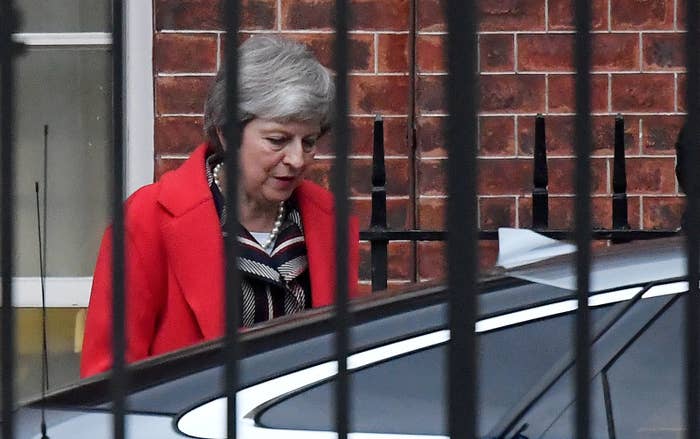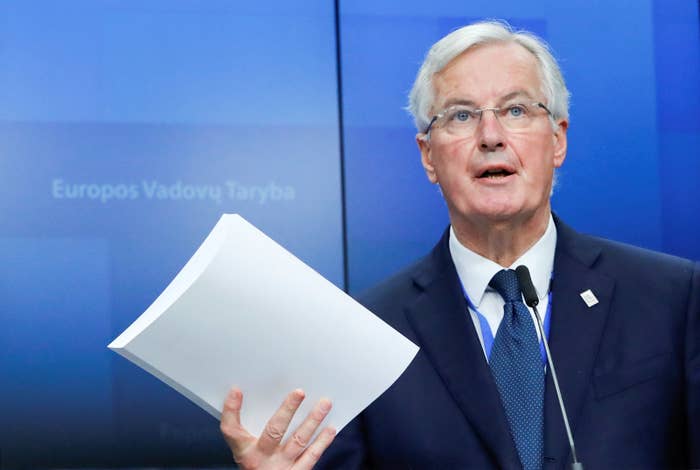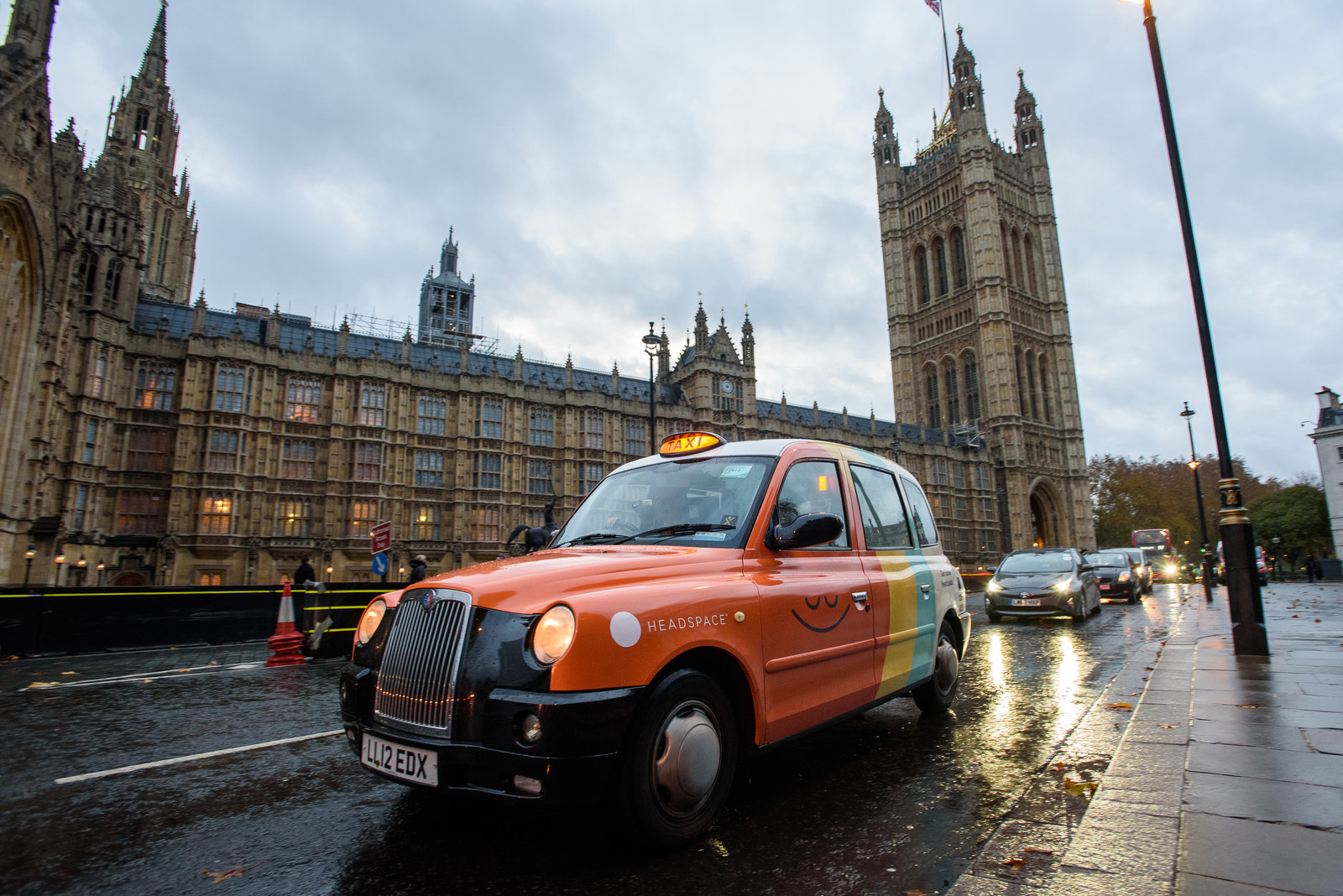
BRUSSELS — The European Union’s remaining 27 member states would reluctantly allow the UK to delay Brexit for a short period of time only in a few specific circumstances, according to multiple EU officials and European diplomats.
European governments and EU officials have made clear, both publicly and privately, that the substance of the withdrawal deal that was endorsed by the 27 leaders last Sunday cannot be up for renegotiation.
Theresa May told a committee of MPs on Thursday that any extension to Article 50 — the two-year process to complete Britain’s departure from the EU, which ends on March 19, 2019 — would require reopening negotiations and would mean the withdrawal deal currently on the table would fall.
Six EU and senior European government officials and diplomats BuzzFeed News spoke to over the past 10 days all stressed that the terms of the withdrawal agreement — the legally binding part of the Brexit deal that covers citizens’ rights, Britain’s financial obligations, avoids a hard border in Northern Ireland under all circumstances, and allows for an orderly divorce — could not be altered.
The president of the European Council, Donald Tusk, told reporters ahead of the G20 summit in Argentina this week that the choice facing MPs was between the deal on the table, no deal, or no Brexit.
However, despite feeling that Brexit has already been a considerable drain on their time and resources, the same sources also said that Article 50 could be prolonged for weeks, or a few months, in several clearly defined scenarios. And they made clear it would be up to the UK to request an extension.
“The UK would need to ask for an extension. Nobody wants it,” said a diplomat from a major European government. “There would need to be a clear purpose. It cannot be for Britain to continue negotiating with itself,” the diplomat added.

The first scenario is mostly logistical, an EU official said. With up to 100 Tory MPs indicating now they will vote against May’s deal, the Brexit agreement is currently expected to be overwhelmingly rejected by the UK Parliament. But several commentators have suggested that MPs might eventually come to support May’s agreement in later votes when they are faced with the prospect of no deal at all as the only alternative.
The same EU official explained: “If the parliamentary process were to drag on into the new year, and the UK needs an extension of a couple weeks to complete ratification, we would allow for that.”
The UK government has said that it needs about three months to complete the entire ratification process.
Other scenarios are less straightforward, and would require a change in the UK’s “political circumstances,” the sources said.
One such case would need to see a fundamental shift in the UK’s red lines — in particular, its position on ending freedom of movement of people, which has been Theresa May’s one unshakable guide throughout the negotiations.
In order to achieve this goal, the UK must leave the EU’s single market — despite the government’s own analysis spelling out the economic consequences attached to this decision and the friction and barriers that it will inevitably add to trade.
EU negotiators have refused to include references to “frictionless trade” in the political declaration outlining the future EU–UK relationship, the second part of the Brexit deal agreed on Sunday, which sets out the framework for a trade deal after Brexit.
But should Britain’s MPs and the government provide clear backing for a workable proposal based on a different set of red lines, the EU27 would take stock of the new circumstances and would be open to changing the blueprint of the future relationship, senior officials from two European governments said.
One EU official, however, warned that the UK would still need to accept the terms of the withdrawal agreement, including the so-called backstop, the insurance policy that keeps the Irish border open in all circumstances, even if the two sides fail to conclude a trade deal in future.
“You cannot change the substance [of the withdrawal agreement]. If you go after the central pillars, it all crumbles away,” one of the officials said. “It balances the UK red lines with the EU’s mandate, all within a legal and constitutional framework.”
The same conditionality would apply to both Norway-style arrangements to access the single market, and the Canada-style free trade agreement advocated by the likes of Boris Johnson and David Davis. “Super Canada”, as the former foreign secretary calls it, or “Canada+++”, as the ex–Brexit secretary describes it, would see the backstop triggered, leaving Northern Ireland in the EU’s regulatory and customs arrangements.

The third scenario is the most complicated. If the UK asks to extend Article 50 to hold a general election or a referendum, the 27 leaders would need to sit down for a “big think”, said an EU official.
But, ultimately, “an extension would not be an issue”, a senior European government official predicted.
All the sources BuzzFeed News spoke to repeatedly reiterated that the terms of Britain’s divorce would not be reopened. Should the House of Commons vote the withdrawal agreement down, the EU’s preparations and communications around a no-deal would rise exponentially, said an EU official. “We would make a big deal of no deal. The [27] leaders would want to ensure that everything is in place.”
“Someone would make a big preparedness speech,” a second official added.
A diplomat from a central European member state said that if parliament votes against the agreement, “then there is no deal”.
“There is no chance of a renegotiation. It is not the EU27’s problem to solve UK parliamentary problems, we all have domestic issues,” the diplomat went on to say. “There is no alternative. But it would be much worse for the UK.”
If Britain does end up crashing out without a deal, the EU is expected to trigger a series of targeted measures to enable continuity in a number of key sectors, such as aviation and financial services, while members of the bloc, including France and Germany, would implement their own contingency plans through emergency legislation and decrees.
“It would be a unilateral sectoral intervention,” a senior EU official told BuzzFeed News. “Any help for the UK would be collateral.”
